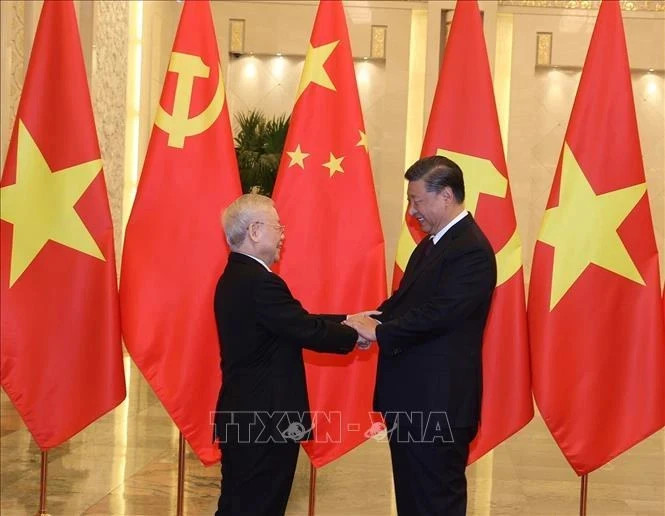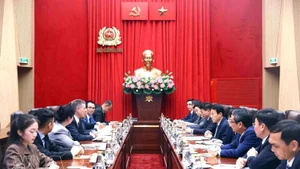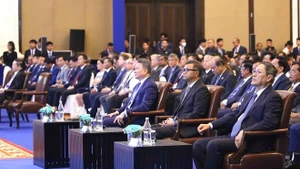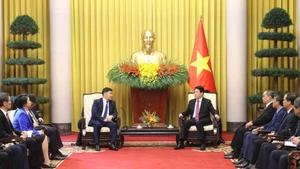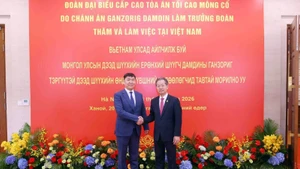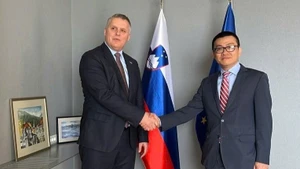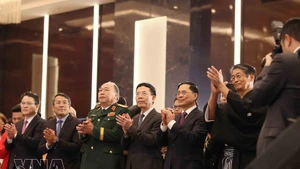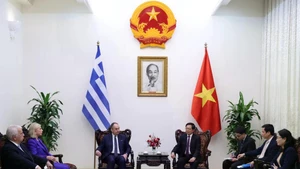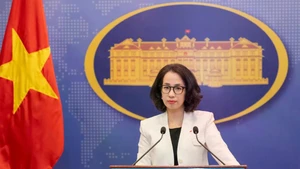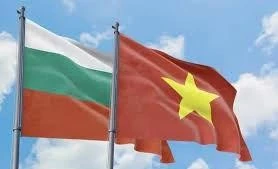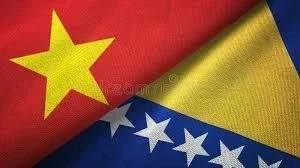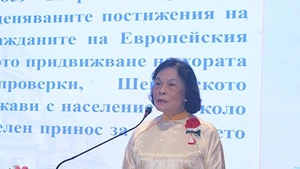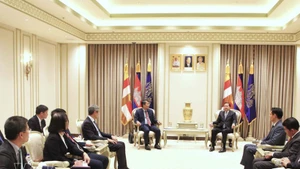This is the third state-level visit of Xi Jinping to Vietnam in his capacity as the Party General Secretary and President of China, and is taking place one year after the Vietnamese Party Chief Nguyen Phu Trong’s visit to China in 2022. The visit is of great importance to the relationship between the two parties and countries.
The visit takes place in the context that the world’s trend of peace, cooperation, and development is being fostered, however, the international situation is witnessing rapid, complicated, and unpredictable changes. Difficulties and challenges outweigh opportunities and advantages. Strategic competition between major countries is fierce and comprehensive. Hot spots of conflict continue to remain complicated. The world economy is recovering slowly with uncertainty and potential risks. Non-traditional security challenges have become more complex. The Asia-Pacific and Indian Ocean region, including Southeast Asia, maintains its position as one of the world’s economic and political centres and is also a key location regarding the competition and gathering of forces of major countries.
Since the 20th National Congress of the Communist Party of China (October 2022), China has basically maintained its political stability and the role of the Communist Party of China in society while consolidating the “leadership core” of General Secretary and President Xi Jinping. China’s economy has recovered at a positive level and science-technology has brought new achievements while the potential and strength of national defence-security have also been maintained and promoted.
China deploys many diverse forms of foreign affairs, boosting both party diplomacy and state diplomacy in addition to launching many initiatives and enhancing its influence on numerous issues at many major international forums. China’s initiatives attract the support and participation of many countries, through which China strengthens its influence in shaping the regional and international order.
From the beginning of the 13th Party Congress, Vietnam has achieved many important results in various fields, including socio-economic development, national defence and security, the building of a law-governed socialist state, and Party building.
Vietnam’s relations with neighbouring countries and Southeast Asian countries have been reinforced within both bilateral and multilateral frameworks. Relations between Vietnam and major countries have also been strengthened. Vietnam continues to contribute actively and responsibly to ASEAN, the United Nations, and many other international forums and organisations. Foreign affairs activities are implemented synchronously and comprehensively on all three pillars of Party diplomacy, state diplomacy, and people diplomacy, including parliamentary diplomacy and defence-security diplomacy.
Vietnam-China relations maintain a positive development trend. After 15 years of implementing the Comprehensive Strategic Cooperative Partnership, Vietnam-China relations have developed positively in many fields, with many highlights, especially after the historic visit to China by General Secretary Nguyen Phu Trong. Political understanding and trust between the two sides has been enhanced, contributing to consolidating the relationship between the two parties and countries as well as between central and local levels, including through high-level visits and exchanges, especially between the two general secretaries, and people-to-people exchanges.
Economic, trade and investment cooperation has continued to expand. China is Vietnam’s largest trading partner and its second largest import market, while Vietnam is China’s fourth largest trading partner in the world and its largest trading partner in ASEAN. China ranks sixth among the 144 countries and territories investing in Vietnam. Bilateral defence-security cooperation has been boosted in many new forms. The two countries have agreed to build defence and security cooperation into one of the pillars of bilateral relations. Cooperation between the two countries at international forums has been expanded, and the two sides also support a number of each other’s initiatives.
The state visit to Vietnam by General Secretary and President Xi Jinping and his spouse is of utmost importance in Vietnam-China relations, demonstrating the respect and top priority of both countries for further consolidating and enhancing the comprehensive strategic cooperative partnership.
Giving a respectful and warm welcome to General Secretary and President Xi Jinping and his spouse, Vietnam affirms its 13th Party Congress’s foreign policy of independence, self-reliance, and diversification and multilateralisation of foreign relations, with top priority given to relations with neighbouring countries. Furthermore, Vietnam consistently attaches great importance to developing a stable and long-term relationship with China on the basis of mutual respect, equality, and mutual benefit while fostering the positive trends, similarities, and connections between the two neighbouring countries, as well as the traditional and friendly relations between the two parties and countries.
May General Secretary and President of China Xi Jinping and his spouse’s state visit to Vietnam be a great success, bringing the traditional neighbourly relations and comprehensive strategic cooperative partnership to a new stage of development and sustainability, for the benefit of the two peoples as well as for peace, stability, cooperation, and development in the region and the world.
